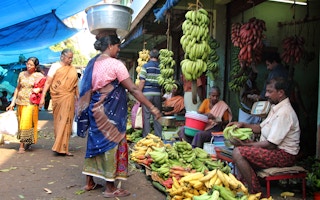On Monday a global panel of scientists representing more than 130 nations released the summary of their Global Assessment Report on Biodiversity and Ecosystem Services, containing dire warnings about rapidly declining biodiversity worldwide and the adverse impacts it will have on human wellbeing.
The report highlights five major ways in which humans are driving these declines in biodiversity and ecosystem services over the last 50 years—changes in land and sea use, direct exploitation of organisms, climate change, pollution, and invasion of alien species.
All these activities are closely interlinked with food systems, and the report itself notes that “feeding the world in a sustainable manner entails the transformation of food systems.”
Food systems are comprised of the many elements that add up to the ways people get their food—the farms where food is produced, the businesses that process food into products, the markets and restaurants where it is sold and consumed, the policies that shape every step of the process, and much more.
While the world has been able to supply more food, energy, and materials to people in most places, this continues to take a toll on the ability to do so in the future. Nature is crucial for food, feed, energy, medicines, and other materials central for human well-being, yet food systems contribute up to 29 per cent of all greenhouse gas emissions and continue to overuse scarce natural resources, contributing to the loss of biodiversity and animal and plant species.
Without urgent action, we will not achieve the UN Sustainable Development Goals, or global climate goals. Taking a food systems approach to ensure human and planetary health at all stages along the food value chain will be critical. Several areas can be prioritised for policy action.
“
Food systems contribute up to 29 per cent of all greenhouse gas emissions and continue to overuse scarce natural resources.
For instance, agricultural policies must shift from promoting the production of high quantities of staple foods like rice, wheat, and maize, to producing healthy foods like fruits and vegetables sustainably.
Governments can reorient subsidies on nutrient-poor foods to provide incentives for investing in more nutritious foods. Protection of biodiversity can also contribute to a more diverse and nutritious diet for people.
We must also use a food systems approach to greatly reduce food losses and waste. Policies to curb retail food waste should be explored, such as France’s ban on supermarkets throwing away quality food before “best-before” dates.
To address food loss in developing countries, where loss and spoilage of food on its way to markets are a bigger problem than food waste, we need to look across the entire supply chain. We will need more evidence on cost-effective, innovative solutions that work for smallholders in developing countries.
Greater investments are needed in research and development of technologies and practices that promote sustainable and climate-resilient agriculture, such as remote-sensing technology that promotes optimal fertiliser use or ecologically-based pest management, to reduce the negative impacts agriculture has on biodiversity and our environment.
Exciting new and potentially transformative technologies can help accelerate the transformation of our food systems. Alternative proteins, such as lab-grown meat can help reduce greenhouse gas emissions from agriculture and the overexploitation of resources; gene editing can improve seeds so they produce more crops and boost the nutritional value of crops; blockchain technologies can enable traceability and transparency along the food chain to help reduce food loss; and e-commerce can better connect rural producers with urban consumers.
When these technologies are used, land can be saved to preserve biodiversity, but scaling these technologies up also must be done with careful consideration for their true impact on smallholders’ productive capacity, employment, children’s nutrition, dietary choices, and the environment.
The food systems approach will be central to guide our action beyond agriculture, to incorporate the entire food supply chain and consumers in transforming global food systems to be healthy, nutritious, and sustainable to preserve biodiversity.
By addressing the whole system by which we grow, buy, and eat our food, we can achieve these multiple wins across the food system to maintain biodiversity for planetary and human health.
Shenggen Fan is director general of IFPRI and a champion of the Food Forever initiative. This story was published with permission from Thomson Reuters Foundation, the charitable arm of Thomson Reuters, that covers humanitarian news, climate change, resilience, women’s rights, trafficking and property rights. Visit http://news.trust.org/climate.











